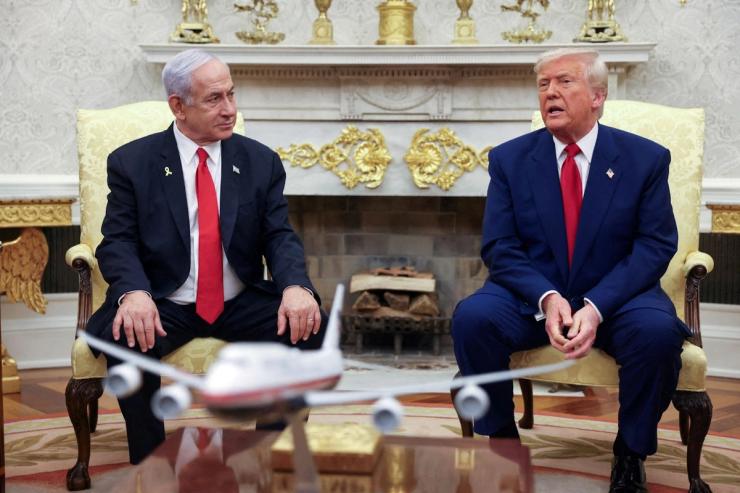Jason’s view
As Israel pounds Iranian targets, President Donald Trump is making clear he has its back. Iran “CAN NOT HAVE A NUCLEAR WEAPON,” he posted on Truth Social, urging Tehran residents to evacuate “immediately” so Israel could carry out strikes with minimal loss of civilian life. After Director of National Intelligence Tulsi Gabbard posited that Iran wasn’t currently building nuclear weapons, Trump responded: “I don’t care what she said.” He’s pushing for a swift Israeli victory rather than a managed conflict, “an end, a real end, not a ceasefire.”
Trump’s view can be distilled simply: genuine peace only comes when the good guys defeat the bad guys and real threats are extinguished. In this case, he has demanded Iran’s “unconditional surrender.” The president’s approach may seem provocative or improvisational. It isn’t. It’s grounded in a consistent worldview, that “America First” never meant America alone.
Having worked closely with Trump for over two decades, including three years in the White House, I have seen his consistent approach. He means what he says. He seeks paths through seemingly impossible obstacles. While many tell him no deal with Iran is possible, he recognizes that under the right circumstances, previously impossible arrangements become achievable. With Iran reeling, he sees an opportunity to attempt such a solution.
It begins with an America First approach to alliances. The president understands that Iran represents a multifaceted threat to Israel, not merely through its nuclear ambitions, but through its missile arsenal and significantly weakened, but still-existing regional terrorist proxies. Israel has long maintained that it will fight its own battles and doesn’t seek American troops on the ground, even against regimes that consider America and Israel two parts of one enemy enterprise. What Israel requests — and what Trump has provided — is diplomatic support, weapons, and trust. It’s a low-risk and high-reward arrangement capitalizing on the two nations’ shared interests.
Trump has demonstrated strategic discipline by not crossing the line, for the moment, into direct military involvement while enabling Israel to conduct operations it has long prepared for. This approach allows America to advance its strategic interests with the potential of not becoming deeply entangled in another Middle East conflict for as long as possible. In the end, America may have to act, and that day may come sooner than we think.
If Iran continues to fold, Trump may see an opportunity to achieve what previous negotiations could not: a comprehensive, enforceable agreement that completely neutralizes the Iranian threat, nuclear or otherwise, to Israel, our Arab allies, and America.
The president won’t be played by Iran buying time. He will not accept a weak deal and he holds all the cards. Any agreement must be verifiable and backed by serious consequences. He understands we cannot rely on other countries or the United Nations to enforce any agreement, because they won’t. The Iranian regime’s track record suggests it cannot be trusted to honor a deal, so Trump will have to find the formula that allows the United States to enforce any deal. If such a deal is not possible, he has other options, including “bunker buster” bombs which could deal a death blow to the Iranian regime’s nuclear aspirations. With each unfolding day, it looks like Tehran has no interest in a real deal. Almost certainly, they never were. Meanwhile, the Islamist regime looks weaker and weaker. Because of those trends, there is a serious possibility Trump will soon choose to act.
While America is not interested in nation-building, after learning its lessons after wars in Iraq and Afghanistan, the possibility of the regime’s downfall has become a serious conversation. There would be plenty to celebrate if Iranians successfully replaced the Islamist regime that has tyrannized them for 45 years. It would be a fitting end to Iran’s leadership, which bears full responsibility for this crisis by building nuclear capabilities while supporting terrorism across the region for decades.
Gulf leaders understand the potential of Israel’s mission to defang the Iranian regime. Gulf states prefer to avoid conflict. They are careful, strategic, and seek diplomacy when it works, but when needed, they will show their teeth and defend their nations. They also stand to gain from the mullahs’ demise through enhanced security, expanded economic opportunities, and the removal of a destabilizing force that has long inhibited regional development and investment. They cast their lot with Trump, and that bet seems to be paying off.
Meanwhile, Trump is showing Iran its options before it hits the point of no return. If Tehran pursued a new approach — surrendering its nuclear program, dismantling its missile arsenal and proxies, and allowing genuine freedom for its people — it could chart a different course. The likelihood of this is exceedingly low.
Trump making the stakes clear is exactly on brand. He doesn’t waste time with niceties or euphemisms. He says things like, “We know exactly where the so-called ‘Supreme Leader’ is hiding…But we don’t want missiles shot at civilians, or American soldiers” and threatening to kill the Ayatollah if he makes a false move. His direct communication style is worth a thousand clever diplomatic maneuvers. He means every word, and it’s working.
Trump’s strategy — supporting Israeli capabilities while maintaining American strategic flexibility — consistently puts America first by using US strength and leverage while keeping allies close. Whether Iran’s leadership recognizes that the US still runs the show on the world stage, including by supporting Israel in this conflict, is another question — one that will determine the once-great nation’s future.
Jason D. Greenblatt was President Donald Trump’s Middle East envoy between 2017 and 2019. He is the author of In the Path of Abraham and the founder of Abraham Venture LLC. Follow him on X: @GreenblattJD
In this article:
Room for Disagreement
By fully backing Israel — which has openly called for regime change in Iran, a country of over 90 million — and ramping up the rhetoric, critics argue Trump is being pulled into a war of choice started by an ally based on disputed intelligence. For all its military successes, Israel has repeatedly shown it lacks the ability to end conflicts, as is painfully evident in the increasingly unpopular and devastating war in Gaza. Threats to kill Iran’s leader will harden Tehran’s position, embolden hardliners, and complicate efforts to reach a diplomatic solution. Gulf states and other US allies are seeking off-ramps to de-escalate and avoid a widening of the conflict, which could spiral with severe security and economic consequences for the region, the world, and — most importantly to “America First” proponents — US interests.
Notable
- Trump’s support for Israel is causing a rift among his “America First” allies, The New York Times and the BBC report.
- Several Trump advisers urged against strikes because it would be an “open-ended campaign.” A Western diplomat warned Israel lacks an endgame without US support or regime collapse, according to The Economist.


